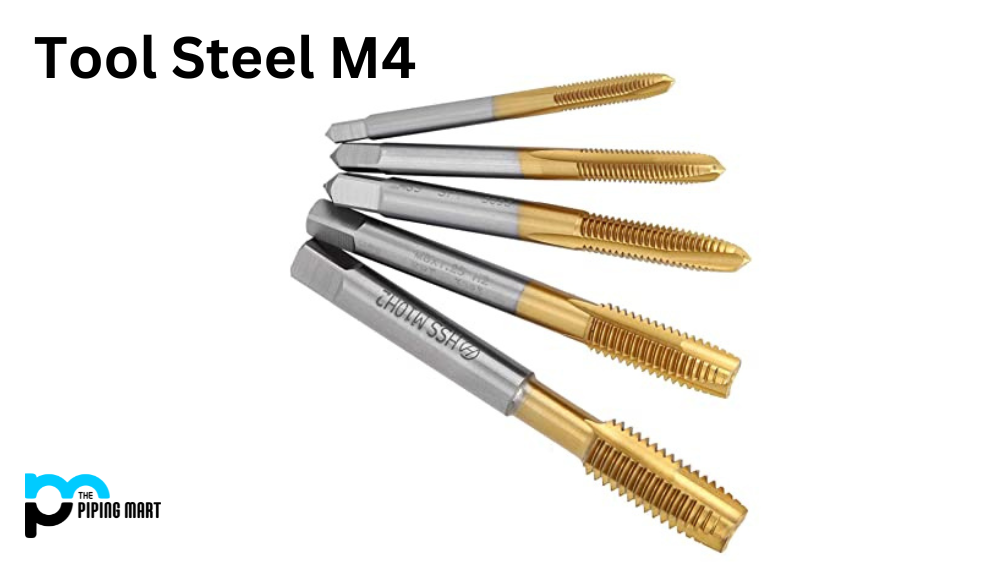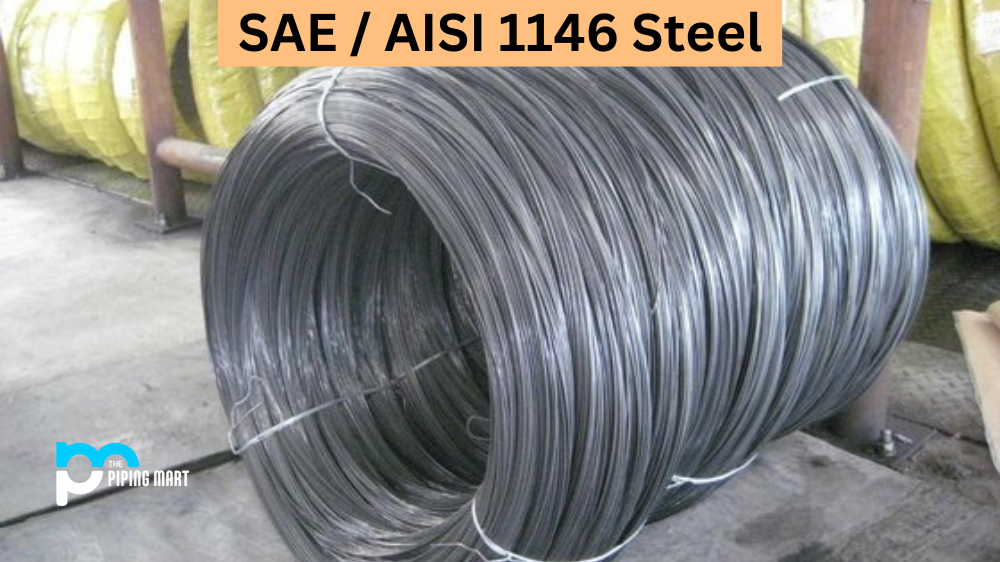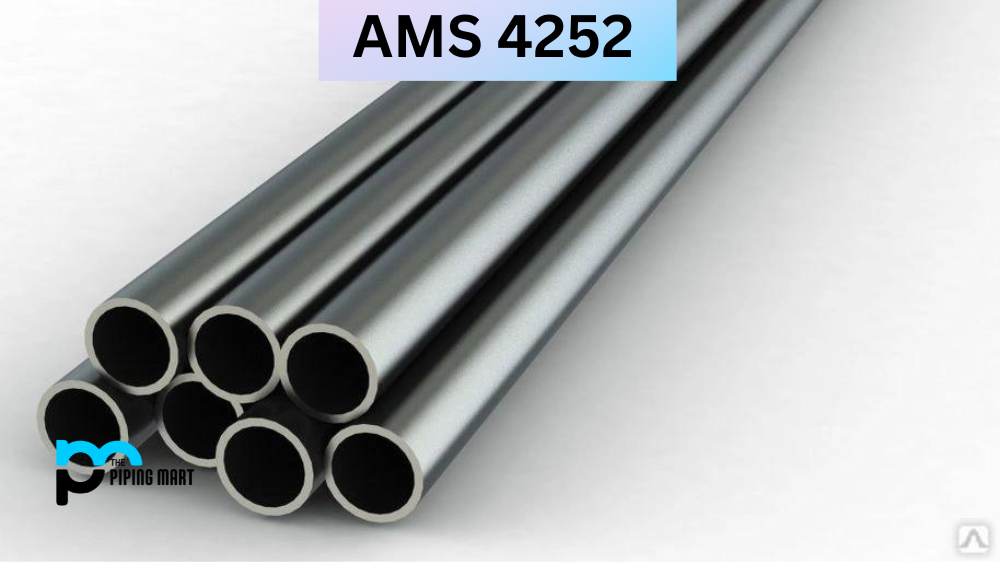Tool Steel M4 is a high-speed steel with excellent wear resistance, toughness, and strength. It is often used for cutting tools, dies, punches, and tool bits. This guide will explore the chemical composition, mechanical properties, physical properties, and uses of Tool Steel M4 and its corrosion resistance, heat resistance, and heat treatment. We’ll also discuss the machining and welding of this popular tool steel.
M4 Tool Steel Composition
Tool Steel M4 has a relatively simple but effective composition which includes 1.3% Carbon (C), 0.40% Silicon (Si), 4% Chromium (Cr), 2% Vanadium (V), 0.25% Molybdenum (Mo) and 8% Tungsten (W). This combination of elements gives it the perfect balance of strength, wear resistance, toughness, and ductility to make it an ideal material for making cutting tools and other metalworking applications.
| Element | Content (%) |
|---|---|
| Fe | Balance |
| C | 1.25-1.40 |
| Mn | 0.15-0.40 |
| Si | 0.20-0.45 |
| Cr | 3.75-4.75 |
| Ni | 0.3 |
| Mo | 4.25-5.50 |
| W | 5.25-6.50 |
| V | 3.75-4.50 |
| Cu | 0.25 |
| P | 0.03 |
| S | 0.03 |
M4 Tool Steel Chemical Properties
The chemical properties of Tool Steel M4 are fairly standard when compared to other tool steels in its class. It has an excellent corrosion resistance and oxidation resistance due to its high chromium content, which also helps improve its hardness at higher temperatures. Additionally, it has good abrasion resistance thanks to its vanadium content which increases the material’s hardenability while also providing some additional wear protection.
M4 Tool Steel Mechanical Properties
The mechanical properties of Tool Steel M4 are impressive indeed! Its tensile strength ranges from 700-1150 MPa, which is incredibly strong for a tool steel grade! Additionally, it has a yield strength between 500-850 MPa with an elongation range between 15-35%. These values demonstrate that Tool Steel M4 is one of the best available options for use in industrial applications where strength, durability and longevity are key requirements, such as cutting tools or dies. Its impact toughness is another highlight, with values ranging from 20-45 J/cm2 depending on the heat treatment applied to the material.
Finally, its fatigue strength is equally impressive, with values ranging from 900-1300 MPa depending on the specific application requirements needed by your project specification.
| Mechanical properties | Metric | Imperial |
|---|---|---|
| Hardness, Rockwell C (tempered at 1200°F) | 59.0 – 61.0 | 59.0 – 61.0 |
| Hardness, Rockwell C (as hardened) | 64.0 – 65.0 | 64.0 – 65.0 |
| Izod impact unnotched (when tempered at 900°F) | 47.0 J | 34.7 ft-lb |
| Abrasion (loss in mm3 , tested at 1000°F; ASTM G65) | 20.2 | 20.2 |
| Abrasion (loss in mm3, tested at 1175°F; ASTM G65) | 28.4 | 28.4 |
| Poisson’s ratio | 0.27-0.30 | – |
| Elastic modulus | 190-210 GPa | 27557-30458 ksi |
M4 Tool Steel Physical Properties
Its physical properties include a density of 7800 kg/m3 which is quite heavy compared to other tool steels in its class; however, this can be beneficial when considering projects such as dies where weight might be desirable due to increased inertia or stability during punching operations under load or vibration conditions such as those encountered on press brakes or punch presses operating in production environments where downtime needs must be kept low due to tight production schedules or deadlines needing met within tight budgets or cost restraints imposed by clients or shareholders expecting quick turnarounds with minimal spend per unit produced to maximize profit margins across their organization’s portfolio of projects being managed simultaneously over multiple timeframes across multiple sectors or geographical locations around the globe today!
| Physical properties | Metric | Imperial |
|---|---|---|
| Density | 7.97 g/cm3 | 0.288 lb/in3 |
| Melting point | 1427 °C | 2600°F |
M 4 Tool Steel Thermal Properties
| Thermal properties | Conditions | ||
|---|---|---|---|
| T (°C) | Treatment | ||
| Thermal expansion | 9.5 x 10-6/ºC | 20-260 | – |
M4 Tool Steel Equivalents
- ASTM A600
- FED QQ-T-590
- SAE J437
- SAE J438
- UNS T11304
M4 Tool Steel Uses
Tool steel M4 is an incredibly versatile and reliable material used in various industries. It offers superior performance when exposed to high heat levels, making it an ideal choice for engine parts and cutting tools. In addition, it exhibits excellent wear qualities and is resistant to rust, making it highly sought after for knives, hammers and punches. Moreover, this cost-effective option is also used for cold work applications such as dies and forming punches due to its great combination of high hardness and toughness. All in all, the diverse uses of Tool Steel M4 make the material a superlative choice for those who need strength and reliability from their equipment.
Corrosion Resistance
Tool steel M4 is known for its superior corrosion resistance and attractive, shiny finish as compared to many other types of steel. Its ability to withstand high temperatures, shock-resistance capabilities, and excellent corrosion resistance make it an ideal choice for various applications, such as engine components, knives, cutting tools, drill bits, machining parts and more. This type of steel has been used in many industries over the years because it strongly resists the effects of rust and other corrosive materials, meaning any products made utilizing this type of steel will last far longer than similar items created with different steels that are often much more susceptible to deterioration caused by environmental exposure.
Heat Resistance
Tool Steel M4 is a reliable and resilient material, especially when it comes to heat resistance. Laboratory tests have proven the strength of Tool Steel M4, as it can retain high-level tensile strength even after subjecting it to extreme temperatures. The temperature range of Tool Steel M4 varies depending on what type of alloy is used, but it can typically withstand up to 1,200 degrees Celsius. This makes it perfect for applications that require materials with high heat resistance, such as gas turbines and injection moulds. Tool Steel M4 is an impressive alloy that will not let you down when the heat is on.
Heat Treatment
When it comes to tool steel M4 heat treatment, it is essential to ensure that the job is done correctly for maximum performance, longevity, and ease of use. For example, M4 can be hardened up to 64 HRC, but proper cryogenic tempering and double tempering processes are necessary to achieve this hardness level while preserving its properties. Furthermore, to maximize the usefulness of the finished product while maintaining efficiency, the temperature should be kept consistent and the cycle time accurately monitored to refine the grain structure properly. You will have no trouble creating top-notch tools by having a handle on these basics of tool steel M4 heat treatment.
Machining
The machinability of Tool Steel M4 is highly exceptional, and its ability to hold an edge is remarkable. This makes it an ideal choice for producing finely detailed parts in an array of complex shapes. It is relatively easy to machine due to its high level of wear resistance and fine grain structure, which decreases chipping and other irregularities along the cutting edges. The hardness of the M4 makes it hardier than most materials, giving greater longevity and durability and eliminating the need for frequent replacement or maintenance. With these characteristics and cost-effectiveness, M4 is an excellent option for projects requiring precision in machining.
Welding
Tool steel M4 welding is an advanced and specialized welding technique used on highly hardened metal, such as tool steel. This particular weld process involves a combination of preheating and post-weld heat treatment to ensure a sound welded joint. The material’s extreme hardness requires an experienced technician to complete such a job successfully – even then, it can be difficult due to its special requirements. Due to the complexity and difficulty involved, only trained professionals with extensive experience are recommended for this type of welding job to ensure that all safety standards are met. With proper care and attention is given, tool steel M4 welding can produce excellent results and offer a quality welded joint with longevity and strength.
Conclusion
All these advantages make Tool Steel M4 an excellent choice for any project requiring a durable, long lasting metal working solution that can withstand extreme temperatures without losing any of its performance characteristics such as hardness or tensile strength while still providing superior corrosion and abrasion resistance along with great machinability allowing it to be worked into intricate shapes quickly without sacrificing any quality thanks again in large part due to its high chromium content which acts like an armor plating protecting against rusting even after prolonged exposure to corrosive environments such as those found near coastal regions containing salt air & water etc… thereby making it ideal for use within maritime settings too such as ships & boats that need reliable parts that won’t corrode in salty sea water & brine conditions encountered out at sea like masts & rigging components used on tall sailing vessels etc… So if your next project needs a reliable metal working solution then consider using Tool Steel Grade M4! You won’t regret it!

Abhishek is a seasoned blogger and industry expert, sharing his insights and knowledge on various topics. With his research, Abhishek offers valuable insights and tips for professionals and enthusiasts. Follow him for expert advice on the latest trends and developments in the metal industry.




